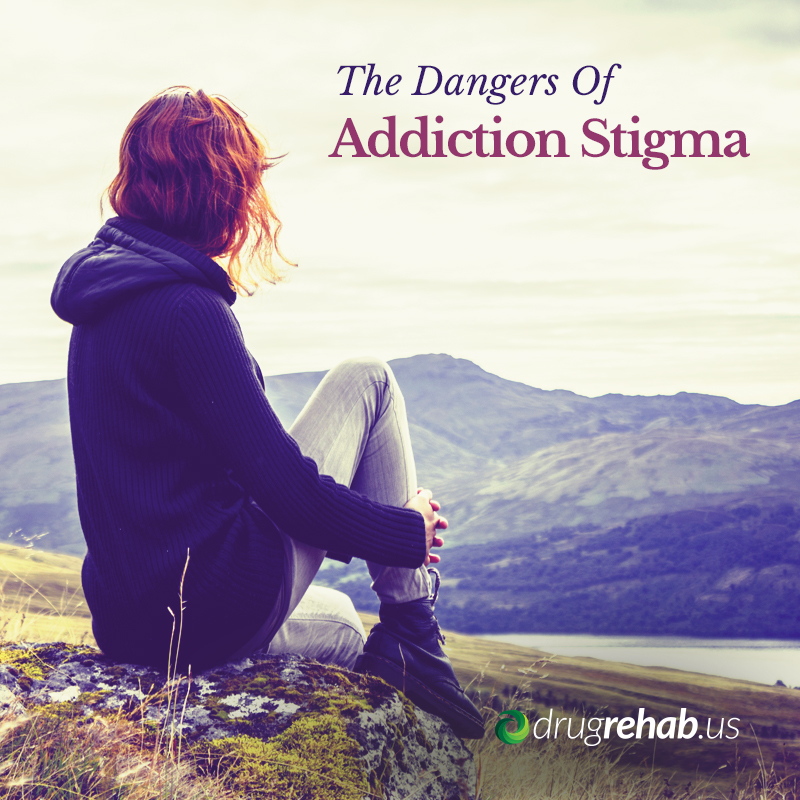18 Dec 2014
The Fight Against Stigma For Pregnant Addicts
Babies born to addicted mothers can face a very difficult start in life. When a pregnant woman is addicted to drugs and continues to use, her baby will come into this world with drugs in his or her system. A newborn who is exposed to drugs such as opiates or narcotics while in the womb will be born with a variety of problems know as neonatal abstinence syndrome.
Drugs like heroin, cocaine or oxycodone pass through the placenta from mother to baby. During pregnancy, the growing baby develops into an addict. Upon birth, the baby is immediately craving drugs, and doctors will have to give the baby drugs that are the same or very similar to the ones taken by the mother to try to ease inevitable withdrawal symptoms. Drug-addicted babies are typically inconsolable. Symptoms of neonatal abstinence syndrome can last from several weeks to several months.
In a perfect world, women who are addicted to drugs would be able to quit using before ever getting pregnant. But it’s rarely that easy to discontinue using drugs. Even when an addict knows she is pregnant and may be harming her child, the compulsion to do drugs is still there.
Difficulties Of Being Pregnant And Addicted
 It’s a growing problem, and there aren’t easy solutions. Programs aimed at helping pregnant women overcome their drug problems are often discontinued or reduced because of funding cuts. Even when programs are available to help pregnant addicts, the women are often afraid to reach out for help.
It’s a growing problem, and there aren’t easy solutions. Programs aimed at helping pregnant women overcome their drug problems are often discontinued or reduced because of funding cuts. Even when programs are available to help pregnant addicts, the women are often afraid to reach out for help.
There is a lot of stigma attached to addiction in pregnancy. Non-addicts are quick to assume that addiction is a choice, and that an addict could stop using if she really wanted to. In some states, using drugs while pregnant may even be considered a crime. In Tennessee, for example, drug use while pregnant is classified as an assault.
When a pregnant addict is arrested instead of offered help, it gives a message to other pregnant addicts that it may be dangerous to try to get help. Many try to detox on their own, which can be extremely dangerous and even life-threatening. Fear of legal consequences, such as losing custody of their other children, stops many women from reaching out for help from medical professionals. Another fear is that the newborn baby will be taken away at birth. So a large number of pregnant addicts continue to suffer in silence.
De-Stigmatizing Addiction In Pregnancy
There are few families that haven’t been touched by addiction in some way. Yet most pregnant addicts are unsure whom it would be safe to talk to, if anyone. Many of them suffer through their entire pregnancies scared and alone. They may continue to abuse drugs because it is the only life they know, or they may try to quit drugs without help, a goal that is rarely successful.
Addiction is frequently misunderstood, and often people see it as a moral failing rather than an illness. This judgmental attitude is intensified when an unborn child may be affected.
If stigma could be removed from addiction in pregnancy, both mothers and babies would benefit. If pregnant addicts were free to seek help and know they wouldn’t be judged or condemned, they could approach motherhood with strength and courage rather than fear and shame.
When pregnant addicts avoid getting help, it is really a form of denial. Addicts and their families may try to pretend that if they ignore the problem of addiction, it will go away. Pregnant addicts learn to lie to their doctors and hide any evidence that they are actively abusing drugs.
Stigma prevents addicts from obtaining good prenatal care and results in babies who are born addicted. These babies may also be born with other medical problems. Many of these problems would be prevented if the mothers were free to get help and didn’t have to live in fear of asking for it.
Few understand the hold addiction has on people and how hard it can be to overcome the compulsion to turn to mind-altering drugs. Addiction is a disease, and women who suffer from it deserve to have options for recovery without fear of stigma or judgment. So do their unborn children.
Why Do Women Continue To Drink During Pregnancy? – Understand More About Why Woman Use While Pregnant
04 Nov 2014
The Danger Of Addiction Stigma
Addiction is one of the most stigmatized diseases there is. Stigma refers to a sense of disgrace or shame attached to an action, behavior or situation. Many people still view addiction as a choice or evidence of weak moral character, and therefore as something shameful. Even as research and scientific evidence point to the medical characteristics of addiction and the chemical brain changes that occur in addicts, we still stigmatize addiction. If you or someone you know has battled addiction you know how overwhelming that stigma can be. It can also be dangerous and it needs to be shattered.
Stigma Prevents Addicts From Getting Help
 Perhaps one of the biggest dangers of stigma is that it keeps addicts from getting the professional help they so desperately need. When society at large views addiction as a moral failing rather than a medical illness, it makes sense that addicts would not want to admit to having a problem with substance abuse.
Perhaps one of the biggest dangers of stigma is that it keeps addicts from getting the professional help they so desperately need. When society at large views addiction as a moral failing rather than a medical illness, it makes sense that addicts would not want to admit to having a problem with substance abuse.
Why admit to something that would make everyone around you think less of you? It hurts to think of being treated that way, but it happens. And for this reason, many addicts deny their problem, hide their habit and refuse to get life-saving help, sometimes until it is too late.
Addiction Treatment Lags Behind Modern Medicine
Another danger of the stigma of addiction sits squarely in the world of medicine and the way in which the disease is treated. In spite of new research that shows the truth about addiction and which keeps growing in scope, treatment lags behind. We now know that addiction is a disease of the brain and should be treated as such. And yet, the majority of addicts in treatment are not getting care that is based on evidence and research. Just a small portion of addicts gets treatment that reflects what we know about addiction. Only when stigma shifts will treatment begin to change.
Addicts Are Going To Jail
The stigma of addiction is also entrenched in the justice system. Many addicts end up in jail for minor drug crimes, such as possession, when they really belong in treatment facilities. Most of the crimes committed by addicts are in the pursuit of drugs; in other words, their actions are a part of the disease. Sending an addict to jail for possession is almost akin to jailing someone with cavities for eating sugary foods or an obese person for having junk food. The latter two may sound ridiculous, but if we remove the stigma from addiction and view it as a disease, sending an addict to jail for having heroin would also sound outrageous.
Shattering Stigma
Stigma is dangerous. It prevents addicts from getting treatment, subjects addicts to sub-standard and ineffective treatment, and puts addicts in jail. If the incidence of addiction is to be reduced, we need to reduce stigma. If you or someone you know is an addict, it’s time to speak out and get help. We can work to end stigma by refusing to be quiet or complacent about addiction. Don’t deny the problem. Actively seek help and evidence-based treatment. Talk about your addiction and make sure people listen.
There is nothing shameful about having a disease and it’s time that everyone recognizes that fact. Stigma is killing addicts and that is the real shame when it comes to addiction. Change is coming, as evidenced by work of researchers and advocates for addicts, and it can’t come soon enough.
Time To Get Started And Take Action – Take That First Step To Addiction Recovery – Call Us Now!
One of the hardest barriers to break through when confronting alcoholism is that of denial. Hollywood stereotypes alcoholics as bums with no home, no job and no family. Who would want to identify themselves as a person worthy of ridicule or pity? Very few and it may be what keeps so many from seeking help.
Universal Negative Effects
 The truth is that alcoholism affects people in every social, educational and professional sphere. This is a non-biased addiction. Finding the courage to admit the problem seems to be one of the greatest obstacles to turning things around. Alcoholics Anonymous meetings confront this hurdle head-on by requiring participants to stand before a group and name their problem – alcoholism. “I am an alcoholic” is a tough admission, but it represents the death of denial.
The truth is that alcoholism affects people in every social, educational and professional sphere. This is a non-biased addiction. Finding the courage to admit the problem seems to be one of the greatest obstacles to turning things around. Alcoholics Anonymous meetings confront this hurdle head-on by requiring participants to stand before a group and name their problem – alcoholism. “I am an alcoholic” is a tough admission, but it represents the death of denial.
The title “alcoholic” is one no one wants to wear and people will go to great lengths to avoid accepting the label. The alcoholic is a person who is not in complete control over his or her behavior. Those being ruled by alcohol may worry that they will sink in the eyes of others if they admit it, but that embarrassment pales in comparison to the joy of regaining control over one’s life.
Regain Control
The good news is that a person can regain control. The American Medical Association defines alcoholism as a medical and psychiatric disease. It goes on to say that alcoholism is considered a treatable disease. This is hope. Alcoholism is a beatable disease, it can be overcome. Life can be better.
A 2010 study found that more than 60 percent of people who recognize their problem with alcohol avoid getting help because of perceived stigma. Two-thirds of the participants in the study with serious drinking issues reported believing that alcoholics were stigmatized. They did not look for a way out of alcoholism because it would mean admitting they were alcoholics and that label carried too much baggage.
Courage in Recovery
The fact is that most likely those who might look skeptically at an admission of alcoholism are probably the very people who should be avoided. Those who care about the alcoholic will applaud the courage it takes to admit the problem rather than stigmatize him or her. As the person moves forward in recovery, it will matter less and less what others may think because the confidence that comes with being in control of life makes what other people think trifling by comparison. It is a terrible shame that health and well-being should ever be captive to misplaced perception.
22 Apr 2013
Coping With the Stigmas of Addiction and Prison
Many conditions and situations carry an unfortunate stigma: poverty, mental illness, addiction and going to prison are not least among them. Those who have not experienced these situations or who have no relationship to anyone plagued by the disease of addiction are often quick to judge. Addiction, in particular, carries a stigma associated with weakness, poor moral character and a lack of willpower. Couple that with the fact that many addicts end up in prison for drug-related crimes and you have a double whammy of judgment and stigma. Anyone who has been to prison, regardless of the reason, must carry that burden forever.
Stigma is a terrible thing to cope with; all addicts understand this. They can describe how people look at them differently, that others fail to trust them for no other reason than their disease, and they know that many people look on them as being deeply flawed. Dealing with that stigma makes it difficult to get into recovery, to admit to having a problem, and to find the courage to get help. Coming out of prison only makes this worse. If you have served time and you face a battle with addiction, there are steps you can take to cope with the unavoidable stigma.
- Get treatment. This point cannot be overstated. The only way you will conquer your addiction is to get professional help. If you have already received treatment, maybe while incarcerated, that does not mean you are at the end of the road. The pressure of the stigma placed upon you by others is a powerful force and one that may contribute to a relapse. Keep up with treatment, even if it means just attending an occasional support group meeting. If you are really struggling, see a trained drug counselor or therapist for some sessions. When you are fully in recovery, the stigma will start to seem less important and will be less damaging.
- Fight feelings of shame and doubt. This may be easier said than done, but it is crucial that you do not let yourself feel the things that represent how others view you. Just because the public at large thinks you are lazy, weak-willed, morally bankrupt, and shameful does not mean that you are. You are what you want to be. You must create the person you want to be, regardless of what others say and think. Always remember that addiction is a disease; it is not a personal weakness or flaw.
- Socialize. It may be tempting to hide away after getting out of prison. Fear of what others will think and what they will say about you is enough to make you want to stay inside and lock the doors, but this is not good for you or your recovery. Isolation will only increase your negative feelings. Be brave and get back out there. Go out with sober friends, go to church and participate in Bible study, get involved in social groups, and consider doing volunteer work. All of these things will take you out of yourself and your dark thoughts and put your energy into more positive activities.
- Join a support group. If you are not already a member of a support group for addicts, join one now. Attending the meetings is a powerful way to stay clean and to take comfort from others who understand your experiences. You may even meet some addicts who have also spent time in prison. Seeing that you are not alone is helpful, because carrying the stigma of addiction as well as one for incarceration can make you feel like you are the only one. If you are new to sobriety or newly out of prison, you will also be able to find inspiration from others at these meetings. People who are years sober still attend meetings and can give you a guide and a model for how to live your life.
- Work on your relationships. In your former life as an addict, you probably did some serious damage to your personal relationships. Going to prison certainly did not help. Now is the time to rebuild those relationships and to regain the trust of the ones you love. When you have them fully back on your side, you can face down any stigma.
07 Nov 2012
Getting Rid of Mental Health Stigma
Mental health issues are an integral part of overall health. Mental health problems are not limited to any particular age category, racial group or geographical location. Mental illness affects all people everywhere.



